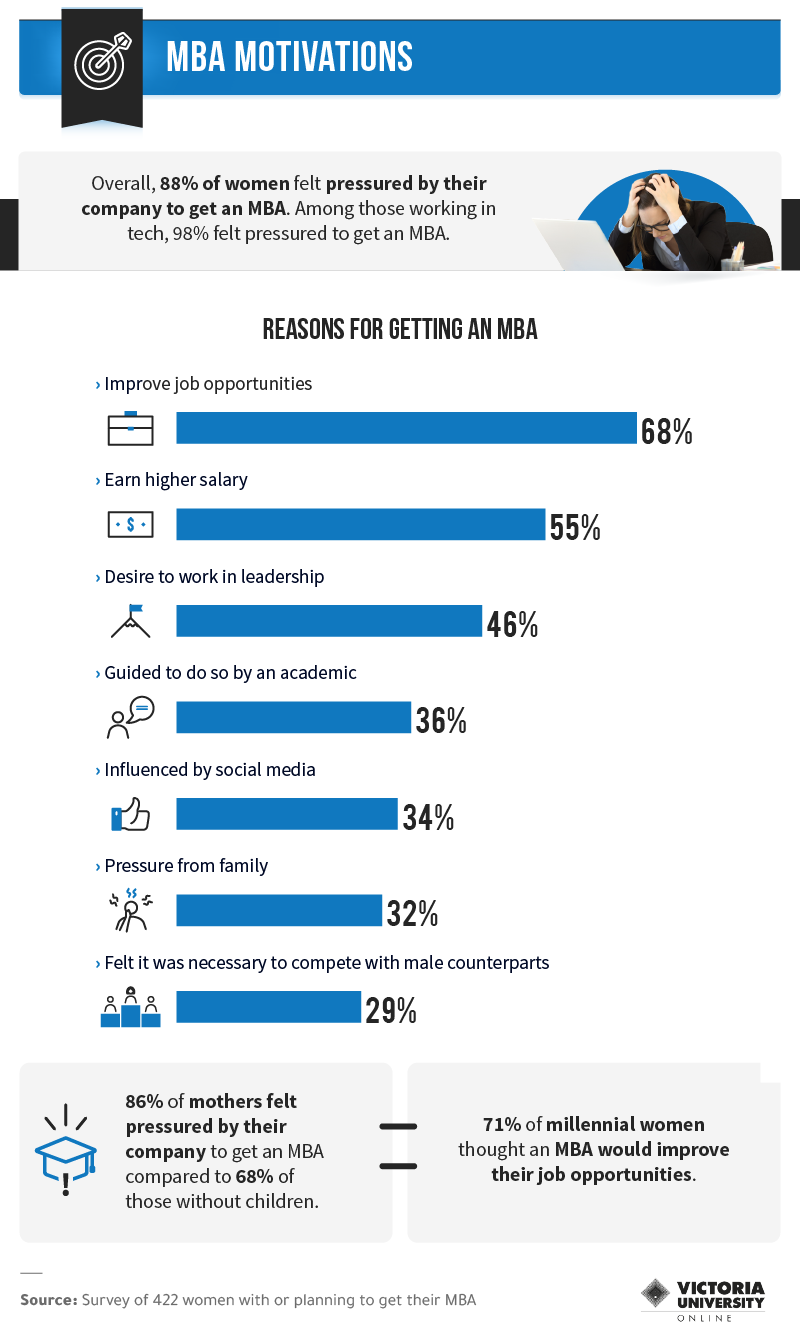
How earning an MBA can benefit women in leadership
Earning a Master of Business Administration (MBA) can be an effective way to advance your career. In recent years, the push for more women in leadership has compelled many to earn this ambitious degree.
There has been an increase in the number of women enrolled in MBAs. We examined the motivations of women who enrolled in this advanced degree, the hurdles they’ve encountered and the outcomes they’ve experienced.
Key takeaways
After receiving an MBA:
- one in four women were promoted to manager
- among all women who earned their MBA, the average salary increase was $38,056
- 78 per cent of women would recommend getting an MBA to other women.
Bridging the gap: Benefits and challenges for women in MBA degrees
While there’s been significant progress in the number of women pursuing MBAs, they still make up less than half of the MBA student population (only 41 per cent). To find out what issues might still hold them back, we recently polled over 400 women who had earned or planned to earn an MBA.
Keep reading to learn more about why female enrolment is increasing, and the challenges and rewards of MBAs for women.
Why are more women pursuing MBAs?
Studying for an MBA can be a significant investment of time and effort. We began our study by asking women why they pursued this higher degree. Here’s a look at what encouraged them to follow this path.

Infographic transcript
MBA motivations
Overall, 88 per cent of women felt pressured by their company to get an MBA. Among those working in tech, 98 per cent felt pressured to get an MBA.
Reasons for getting an MBA
- Improve job opportunities: 68 per cent
- Earn higher salary: 55 per cent
- Desire to work in leadership: 46 per cent
- Guided to do so by an academic: 36 per cent
- Influenced by social media: 34 per cent
- Pressure from family: 32 per cent
- Felt it was necessary to compete with male counterparts: 29 per cent
86 per cent of mothers felt pressured by their company to get an MBA compared to 68 per cent of those without children.
71 per cent of millennial women thought an MBA would improve their job opportunities.
Source: Survey of 422 women with or planning to get their MBA
Overall, most women chose an MBA to get better job opportunities, a higher salary or a leadership position, all of which are achievable goals, especially considering the focus on gender equality in leadership in Australia.
However, others said their motivations were more nuanced, revealing external factors such as:
- influence from academics, social media and family
- feeling like they needed to compete with male colleagues
- pressure from their company, especially among women working in the tech industry
With such a comparatively large number of men working in tech, it makes sense that women in the field might feel a greater need to pursue a master’s degree to compete. After all, having an MBA can:
- advance tech careers
- increase confidence
- improve business and analytical skills
Additionally, we found an imbalance in the workplace between women who have kids and those who don’t:
- 86 per cent of working mothers felt pressured by their company to pursue an MBA
- 68 per cent of employees without children felt pressured by their company to pursue an MBA
Considering the preconceptions about juggling motherhood and a career, working mothers likely wanted to show employers their dedication to the job regardless of their parenting status. They might also have felt driven by the career opportunities an MBA degree can provide.
However, for many women in leadership, choosing to get an MBA was the easy part; deciding where to get it took much more consideration.
How did women choose the right MBA for them?
The characteristics that make up a good MBA degree are different for everyone. The women we surveyed shared what they valued most when looking at universities and what they were most interested in learning.

Infographic transcript
Choosing the curriculum
Most influential factors when choosing a course
- Flexibility: 60 per cent
- Cost: 54 per cent
- Location: 44 per cent
- Faculty: 40 per cent
- Prestige: 39 per cent
- Available scholarships: 37 per cent
- Specialisation options: 34 per cent
- Diversity: 32 per cent
- Attended by co-workers: 30 per cent
- Notable alumni: 28 per cent
Mothers were more interested in available scholarships by eight percentage points.
Source: Survey of 422 women with or planning to get their MBA
The decision to get an MBA is one challenge, but committing to a specific course can be an intimidating process. When asked about the most crucial aspects of an MBA course, flexibility and cost took precedence.
One MBA graduate told us that MBAs could better serve women by offering “more financial assistance and flexibility for completing classwork assignments”. These aspects were essential to mothers. Women with children were 8 per cent more interested in scholarship opportunities than those without children.

Infographic transcript
Most desired subjects
- Business ethics: 44 per cent
- Behavioural finance: 38 per cent
- Women in leadership: 38 per cent
- Organisational behaviours: 38 per cent
- Management consulting: 34 per cent
- Business in the Metaverse: 29 per cent
- Strategic negotiations: 28 per cent
- NFTs: 27 per cent
- Cryptocurrency: 27 per cent
- Arts administration: 27 per cent
- Agribusiness: 26 per cent
- Urban development: 25 per cent
- Executive coaching: 25 per cent
- Wine business: 25 per cent
- Hotel and restaurant management: 24 per cent
Nearly one in three millennial women were interested in taking a subject on business in the metaverse.
29 per cent of millennial women wanted classes on NFTs and cryptocurrency.
Source: Survey of 422 women with or planning to get their MBA
Most women desired traditional business classes in terms of curriculum, but some were more interested in learning about cutting-edge tech trends.
Millennials, in particular, were interested in these new subjects, with 32 per cent of them wanting to learn about business in the metaverse and 29 per cent wanting to learn about NFTs and cryptocurrency. Subjects about crypto can help women in leadership actively participate in a rising industry calling for more knowledge and expertise.
Choosing a subject where they’ll feel represented was also a high priority. A female MBA graduate working in healthcare shared with us that MBAs could serve women better by employing women and minority professors. These women need an inclusive learning environment that makes them feel understood and meets their unique needs.
Did MBA degrees meet the needs of their female students?
Unfortunately, many female students had desires that didn’t come to fruition in a real-life degree. Women in graduate studies often have a number of responsibilities outside of their MBA degree, such as full-time jobs, childcare and housework. Most of the women we surveyed found their degree lacking in accommodations for their commitments outside of study.

Infographic transcript
Problematic courses
94 per cent of women said they had at least one unmet need during their degree.
Percentage of women whose needs were met:
- Flexibility – Overall: 43 per cent with kids: 40 per cent, without kids: 49 per cent
- Curriculum – Overall: 46 per cent, with kids: 40 per cent, without kids: 59 per cent
- Representation – Overall: 49 per cent, with kids: 47 per cent, without kids: 54 per cent
- Cost – Overall: 52 per cent, with kids: 53 per cent, without kids: 50 per cent
- Course options – Overall: 57 per cent, with kids: 54 per cent, without kids: 64 per cent
Percentage with adequate
- Mentorship opportunities: 88 per cent
- Networking opportunities: 94 per cent
Only 44 per cent of millennial women felt well represented by their degree.
Women in tech reported having the highest number of needs met by their degrees.
Source: Survey of 422 women with or planning to get their MBA
We can’t ignore the struggle of attending MBA classes on top of a busy schedule. It can be especially hard for mothers and women who can’t afford to cut back their work hours.
Though many of the women we spoke to were eager for their postgraduate degrees to deliver on flexibility and subject relevance, 94 per cent said they had at least one unmet need during their MBA. Specifically, 57 per cent said their MBA failed to meet their flexibility needs.
Diversity also remains a significant issue for women and one that millennials seemed to suffer the most: Only 44 per cent felt well represented by their MBA.
Most respondents also reported that their MBA provided adequate mentorship and networking opportunities. This finding is promising since MBA networking opportunities can also be very beneficial.
Fostering the right relationship at the right time can provide access to career advancements in the future.
Students can study VU’s online MBA from anywhere, creating a diverse cohort of students. Through VU Collaborate, our online learning environment, MBA students can easily connect with peers and academics, which can help build a strong professional network.
How did MBAs impact womens’ careers?
Now that we’ve hashed out the positive and negative experiences women have had with MBAs, let’s look at how completing these degrees impacted our respondents’ careers.

Infographic transcript
Results of recognition
79 per cent of women reported having higher-level jobs upon earning an MBA, with one in four being promoted to manager.
Most common impacts of earning an MBA
- Higher salary: 58 per cent
- More responsibility: 47 per cent
- More respect: 44 per cent
- New title: 43 per cent
- New job: 43 per cent
- More employees to manage: 41 per cent
- Employed in a new industry: 39 per cent
Over half of women who had completed an MBA reported receiving a higher salary with an average increase of $38,056. Women in tech, on average, received a $44,721 raise.
Average post-MBA salary increase:
- Without kids: $44,592
- With kids: $34,685
How likely are you to recommend getting an MBA to other women?
- Likely: 78 per cent
- Neither likely not unlikely: 10 per cent
- Unlikely: 12 per cent
Source: Survey of 422 women with or planning to get their MBA
Earning an MBA resulted in many positive outcomes, including higher-level jobs (reported by 79 per cent) and salary increases (reported by 58 per cent). These were the most common impacts on women’s careers post-MBA. One-quarter of women were promoted to a management position—another cause for celebration.
However, women in leadership remain underrepresented and they’ve also been paid less than their male counterparts for far too long. Among mothers who got MBAs:
- 35 per cent had earned theirs in the past three years
- 43 per cent of those women received a title change afterwards
Sadly, women working in tech felt the most pressure and less than half of them received a higher salary post-MBA, while 52 per cent said they were assigned more responsibilities.
Though many participants pursued an MBA to excel in their current job, others were looking to switch to a different role. Armed with new skills and more professional connections, 43 per cent of the women we surveyed were able to change jobs as a result of getting their MBA.
Unfortunately, we also discovered some negative experiences among women who earned MBAs:
- 63 per cent of women without kids received a raise
- 55 per cent of mothers said the same
Furthermore, salary raises for women without kids were almost $10,000 higher than those for working mothers.
How can MBAs adapt to better meet women’s needs?
More women than ever before are choosing to enrol in MBAs today, showing that they’re working to improve their careers and financial opportunities. The increase in women seeking advanced degrees to excel in male-dominated industries, particularly tech, is even more promising.
Of the women we surveyed, 55 per cent wanted a higher salary and 58 per cent got it—a big step toward equalising the wage gap between men and women in business.
However, getting an MBA isn’t the whole solution. Sixty per cent of the women who participated in an MBA desired flexibility, but only about 43 per cent received it. Despite some disappointments with unmet needs, most women would recommend an MBA to others.
There’s room for universities to improve their MBA offerings to meet women’s needs better. We hope that this new knowledge about women and MBAs can help women continue advancing in male-dominated fields, and achieve gender equality in wages and leadership roles overall.
VU’s online MBA is adaptable and flexible
VU’s online MBA offers completely online coursework, as well as access to video content when it suits your schedule. We also offer an award-winning Block Model for postgraduate degrees, which allows you to study one unit at a time over each seven-week study period. This model is flexible and accessible, designed to meet the needs of women and anyone who is juggling multiple priorities outside of their education.
Examining gender equality in leadership
It’s clear from the survey that many women undertake an MBA because they’re ambitious. They want to advance their careers, increase their salaries, become executives or join a board. Is this happening in Australia, though? If it is happening, how is it happening?
The issue of gender equality in leadership is a contentious one. Should organisations appoint more women to their boards simply to achieve gender balance, or should board appointments be made based on merit alone?
One thing we can all agree on is that there aren’t enough women on boards. Although women account for 48 per cent of the workforce in Australia, they only occupy 34.2 per cent of boardroom seats.
The benefits of a gender-balanced board
There’s evidence, both empirical and anecdotal, to suggest that gender diversity in the boardroom can benefit an organisation.
The findings from the Corporate Governance Institute indicate that companies with a higher number of female board directors are more likely to achieve better financial performance than those with a lower representation of female directors.
Corporate governance has also been found to improve when boards include female directors. The Australian Institute of Company Directors unequivocally says that better diversity improves a company’s decision-making, as well as its ability to innovate and be creative.
When it comes to gender equality in business, boards that lead by example create a culture of fairness across the organisation, making them attractive to employees, customers and shareholders alike.
For this reason, women who undertake an MBA have every reason to aspire to and believe they’ll succeed at achieving a leadership, executive or board position.
Advance your career as a woman in leadership
There’s no doubt that an MBA can help you advance your career if you aspire to be a female leader. If you’re looking for a way to juggle postgraduate study with all of your other commitments, our 100% online MBA could be for you.
In addition to the standard MBA, we offer specialisations in Finance and Change Management, so you can tailor your education to fit your interests.
Our Block Model allows you to study part time, complete as many as six units per year and finish your MBA in as little as two years. You’ll also receive one-on-one academic support seven days a week (even in the evenings) from our specially designed support network.
Connect with engaged academics, your dedicated student success advisor and your peers through VU Collaborate, our seamless, community-focused platform.
Ready to take the next step? Reach out to our Student Enrolment Advisors on 1300 682 051 or email futurestudy@online.vu.edu.au.
Research methodology
We surveyed 422 women using Amazon Mechanical Turk and Prolific: 66 per cent had already earned an MBA and 34 per cent were planning to get it in the future. For numerical, open-ended response questions, outliers were removed. Additionally, respondents were required to answer an attention check question to prove they were taking our survey seriously. Self-reporting may cause some limitations, such as telescoping, selective memory or exaggeration.
Fair use statement
If you’d love to forward this article to any ambitious women in your life or former co-workers who are doing great things, we encourage you to do so. All we ask is that you send it for non-commercial use and that you include a link back to the original page.
-
View previous article
 When should you study an MBA?13 July 2024
When should you study an MBA?13 July 2024 -
View next article
 How to apply for an MBA with VU Online31 July 2024
How to apply for an MBA with VU Online31 July 2024

